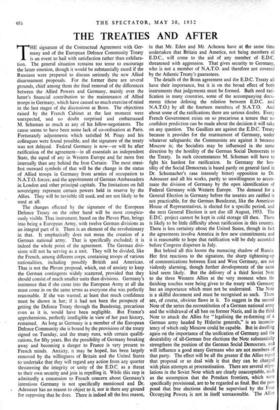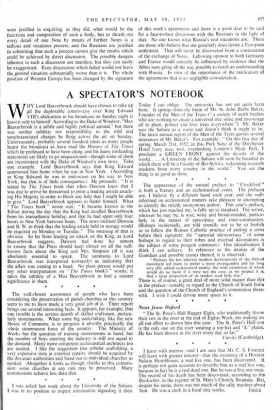THE TREATIES AND AFTER
THE HE signature of the Contractual Agreement with Ger- many and of the European Defence Community Treaty is an event to hail with satisfaction rather than exhilara- tion. The general situation remains too tense to encourage the latter emotion, though it would be substantially eased if the Russians were prepared to discuss seriously the new Allied disarmament proposals. For the former there are several grounds, chief among them the final removal of the differences between the Allied Powers and Germany, mainly over the latter's financial contribution to the maintenance of Allied troops in Germany, which have caused so much exercise of mind in the last stages of the discussions at Bonn. The objections raised by the French Cabinet at the last moment were unexpected, and no doubt surprised and embarrassed M. Schuman as much as any of his fellow-negotiators. The cause seems to have been some lack of co-ordination at Paris. Fortunately adjustments which satisfied M. Pinay and his colleagues were found possible, and the signature of the treaty was not delayed. Federal Germany is now—or will be after ratification of the agreement—in all essentials an independent State, the equal of any in Western Europe and far more free internally than any behind the Iron Curtain. The most mani- fest outward symbols of that will be the change in the status of Allied troops in Germany from armies of occupation to N.A.T.O. forces; and the appointment of German Ambassadors in London and other principal capitals. The limitations on full sovereignty represent certain powers held in reserve by the Allies. They will be invisible till used, and are not likely to be used at all.
The changes effected by the signature of the European Defence Treaty on the other hand will be most conspicu- ously visible. That instrument, based on the Pleven Plan, brings into being a European Army, with twelve German divisions as an integral part of it. There is an element of the revolutionary in that. It emphatically does not mean the creation of a German national army. That is specifically excluded; it is indeed the whole point of the agreement. The German divi- sions will not be serving as a unit. They will be divided, like the French, among different corps, containing troops of various nationalities, including possibly British and American. That is not the Pleven proposal, which, out of anxiety to keep the German contingents widely .scattered, provided that they should consist of much smaller units than divisions. Germany's insistence that if she came into the European Army at all she must come in on the same terms as everyone else was perfectly reasonable. If she was wanted, at least that much confidence must be shown in her; if it had not been the prospects of getting the Defence Treaty through the Bundestag, precaiious even as it is, would have been negligible. But France's apprehensions, perfectly intelligible in view of her past history, remained. As long as Germany is a member of the European Defence Community she is bound by the provisions of the treaty signed on Tuesday, and the treaty runs, with certain qualifi- cations, for fifty years. But the possibility of Germany breaking away and becoming a danger to France is very present to French minds. Anxiety, it may be hoped, has been largely removed by the willingness of Britain and the United States to undertake that they will regard any action from any quarter threatening the integrity or unity of the E.D.C. as a threat to their own security and join in repelling it. While this step is admittedly a concession to French concern about Germany's intentions Germany is not specifically mentioned and Dr.
• Adenauer has no reason to object to it, nor is there any ground for supposing that he does. There is indeed all the less reason, in that Mr. Eden and Mr. Acheson have at file same time undertaken that Britain and America, not being members of E.D.C., will come to the aid of any member of E.D.C. threatened with aggression. That gives security to Germany, who is not a member of N.A.T.O. and therefore not covered by the Atlantic Treaty's guarantees.
The details of the Bonn agreement and the E.D.C. Treaty all have their importance, but it is on the broad effect of both instruments that judgements must be formed. Beth need rati- fication in many countries, some of the accompanying docu- ments (those defining the relation between E.D.C. and N.A.T.O.) by all the fourteen members of N.A.T.O. And about some of the ratifications there are serious doubts. Every French Government exists on so precarious a tenure that no confident prediction can be made about the decision it will take on any question. The Gaullists are against the E.D.C. Treaty because it provides for the rearmament of Germany, under whatever safeguards; the Communists are against it because Moscow is; the Socialists may be influenced in .the same direction by the hostility of the German Social Democrats to the Treaty. In such circumstances M. Schuman will have to fight his hardest for ratification. In Germany the hos- tility of the Social Democrats is based partly on general (and in Dr. Schumacher's case intensely bitter) opposition to Dr. Adenauer and all his works, partly to unwillingness to accen- tuate the division of Germany by the open identification of Federal Germany with Western Europe. The demand for a General Election in Germany before the treaties are ratified is not practicable, for the German Bundesrat, like the American House of Representatives, is elected for a specific period, and the next General Election is not due till August, 1953. The E.D.C. project cannot be kept in cold storage till then. There is likely to be little difficulty about ratification in this country. There is less certainty about the United States, though in fact the agreements involve America in few new commitments and it is reasonable to hope that ratification will be duly accorded before Congress disperses in July.
But behind all this looms the menacing shadow of Russia. Her first reactions to the signature, the sharp tightening-up of communications between East and West Germany, are not violently alarming, though further developments of the same kind seem likely. But the delivery of a third Soviet Note to the three Western Allies at the very moment when the finishing touches were being given to the treaty with Germany has an importance which must not be underrated. The Note is a skilful document and must be recognised as such. There are, of course, obvious flaws in it. To suggest in the second Note of the series the, reconstitution of a German national army and the withdrawal of all ban on former Nazis, and in the third Note to attack the Allies for " legalising the re-forming of a German army headed by Hitlerite generals," is an inconsis- tency of which only Moscow could be capable. But in dwelling again (4 the importance of the unification of Germany and the desirability of all-German free elections the Note substantially strengthens the position of the German Social Democrats, and will influence a good many Germans who are not members of that party. The effect will be all the greater if the Allies reject that proposal or so deal with it that they can be charged with plain attempts at procrastination. There are several stipu- lations in the Soviet Note which are clearly unacceptable, such as the assumption that the Potsdam frontiers, which were specifically provisional, are to be regarded as final. But the pro- posal that free elections should be supervised by the Four Occupying Powers is not in itself unreasonable. The Allies
were justified in enquiring, as they did, what would be the functions and composition of such a body, but to thrash out every detail of one Note by means of further Notes is a tedious and vexatious process, and the Russians are justified in submitting that such a process cannot give the results which could be achieved by direct discussion. The possible dangers inherent in such a discussion are manifest, but they can easily be exaggerated. Even discussions which failed would not leave the general situation substantially worse than it is. The whole position of Western Europe has been changed by the signature of this week's agreements and there is a good deal to be said for a face-to-face discussion with the Russians in the light of that. No one knows what Russia's real intentions are. There are those who believe that she genuinely does desire a European settlement. That will never be discovered from a continuance of the exchange of Notes. Left-wing opinion in both Germany and France would certainly be influenced by evidence that the Allies were going all the way possible to reach an understanding with Russia. In view of the importance of the ratification of the agreements that is no negligible consideration.











































 Previous page
Previous page